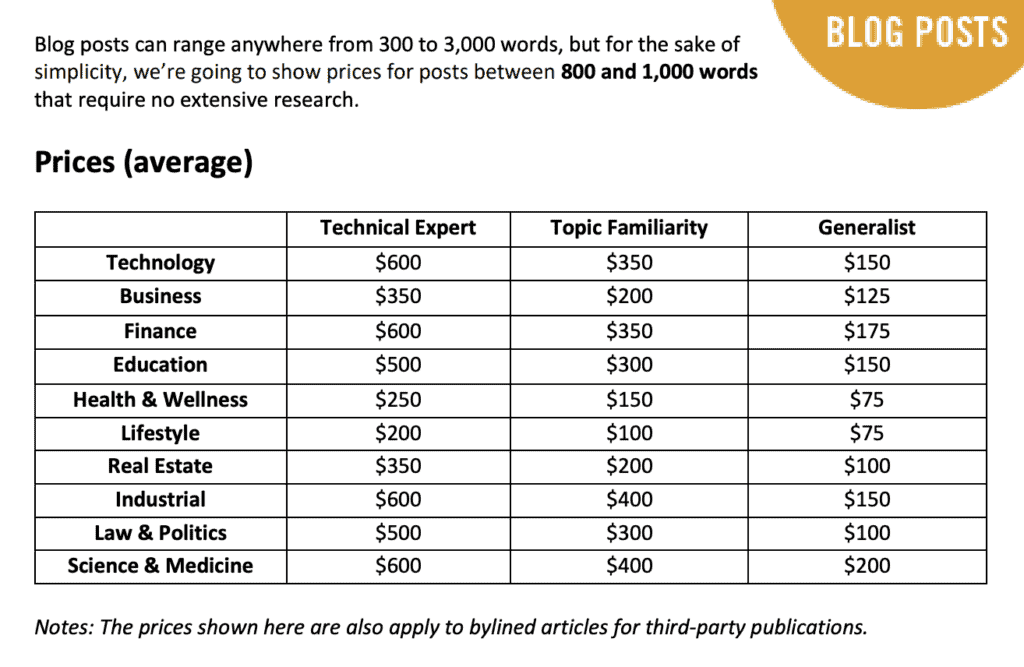6 Reasons Why Having a Niche Will Transform Your Freelance Writing
Let’s talk about why having a freelance writing subject expertise is so powerful.
There are six major reasons for this.
1. Having a niche will immediately reduce how much competition you have.
A quick search on LinkedIn for the term “freelance writer” is going to bring up 849,000 freelance writers.

Keep in mind that this is also only showing the people who have the term freelance writer in their profiles. It also only includes freelance writers who have created a LinkedIn profile.
That’s a lot of competition if you’re trying to find a client. If you’re a generalist freelance writer, you will be competing against those 849,000 other freelance writers.
But if you can pick a subject area to focus on, you will have dramatically less competition.
For example, say you pick health and wellness and you become a health and wellness writer. How many freelance writers show up for the term “health and wellness writer?” Just 497.

That’s WAY less competition. The writers who have chosen health and wellness as their subject expertise have 0.06% as much competition as generalist freelance writers.
2. Because high-paying companies almost always want to work with subject experts.
Clients who pay well usually want and expect great content. They value content. They are ready to pay for it. Because of this, they usually seek out freelance writers with expertise in their subject area. They want someone who can talk to their audiences in an intelligent, engaging way. They want someone who “gets” their business.
Often, clients like this won’t even consider working with a generalist. They want a specific type of writer. If you can be that specific type of writer, you’re all but a shoo-in for getting hired.
There’s another reason why clients like this want freelance writers with subject expertise: The clients’ audience.
Often, clients who pay well have sophisticated audiences. Their audience members may have a degree in the subject area. Or they may have a decade of experience in the industry. So it’s all the more important for companies like this to find a writer who can talk to their audiences with authority; who can use the audience’s language and cite experiences and principles they are familiar with.
Be prepared to prove your freelance writing subject expertise to these types of high-value clients, too. It’s not enough to just say you are a subject expert. Honestly, it’s not even enough to show them proof of a degree or a certification.
To prove yourself to these types of companies, show them clips. You need to have at least three examples of work (preferably bylined work) in their subject area.
3. Subject experts have an easier time being visible and are more likely to be sought out by high-value clients.
This is a corollary to the prior point, but it’s important enough to highlight on its own.
Because high-paying clients want subject experts so badly, they will often seek them out.
Having clients seek you out has a slew of benefits, including:
- Letting you be in the power position for negotiating
- Saving you hundreds of hours per year by not having to look for clients
Being a subject expert also helps you be more visible, in part because if someone searches for your specialty + “freelance writer,” they’ll be more likely to find you.
But most importantly, as a freelance writer with a subject focus, you’ll also have an easier time when you do decide to be visible.
For example: Want to write a column for a trade magazine? You’ll probably be the only freelance writer doing that for the magazine, which all but puts your name in big bright lights for the magazine’s readers… who are also your ideal clients.
4. Subject experts earn more than generalists.
Subject experts will often get three to five times as much money for the same assignment as a generalist will get.
Don’t believe it? Here’s a screenshot from one of the higher-paid content services.

As you can see, the generalists get a decent amount of money for an 800 to 1,000-word blog post from this service. But subject experts get three to four times more.
5. Subject specialists are more efficient.
Ultimately, it doesn’t matter if you make $100 or $1,000 per blog post. What matters is your hourly rate. And this is where subject experts shine.
Because freelance writers who focus on a subject area know it so well, they can produce better content faster than generalists can.
Often, a freelance writer with a subject focus can produce a first-rate 1,500-word blog post in two hours or less if they’re writing for a client and an audience they know. It would take a generalist at least twice as much time to produce the same content at the same level of quality and subject fluency.
Efficiency like that pays off. Literally. If a writer can easily produce five $500 blog posts every week, they’ll bring in $2,500 a week and $10,000 a month – more than enough to earn six figures per year. But if they can only produce three 1,500-word posts per week, then they’re earning $1,500 per week or $6,000 per month. That’s not a bad income, but 40% less than what the more efficient freelance writer will earn.
6. Subject experts don’t have an income ceiling.
Freelance writers – even very successful freelance writers – have an income ceiling.
Maybe it’s $100,000 a year. Maybe it’s $150,000 a year. Maybe you’re an amazing, break-the-mold exception and you can pull off $200,000 a year as a freelance writer because you can finish seven $600 blog posts per week. But that’s still an income ceiling.
There’s only so much we can write.
Subject experts don’t have an income ceiling. They can pivot easily into being public speakers, authors, course creators, consultants, or consultancies.
So a freelance writer who is willing to evolve into a subject expert could take their knowledge of the subject area, add some ambition and grit, and evolve into pretty much anything they wanted to.
Being able to see this as a possibility may require you to expand your understanding of what writers are capable of.
As writers, we are fundamentally communicators. Once you’ve got really strong subject expertise, you can communicate that subject expertise to people through mediums beyond text. You can, if you choose, become considerably more than “just” a freelance writer.
Of course, you can also “just” be a freelance writer with a subject specialty, and you can do very well with that. It is absolutely okay to stay with what works so long as it’s working for you.
Note: There are ways for freelance writers to increase their incomes, but they all involve morphing into something besides a freelance writer – like becoming a content agency, for example.
If Being a “Subject Expert” Makes You Uncomfortable, How About “Subject Speciality?”
Clearly, freelance writers gain a bunch of advantages when they position themselves as subject experts.
But what if the term “subject expert” makes you uncomfortable?
No problem. Consider picking a “subject specialty” instead. Or maybe picking a “subject expertise.” Play around with the terms as you like. Call yourself whatever you want.
Just pick a subject area to focus on. It will make a huge difference in how much you earn and how hard you have to work to get clients.




